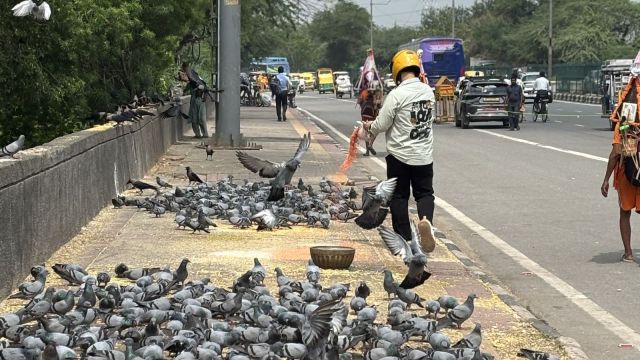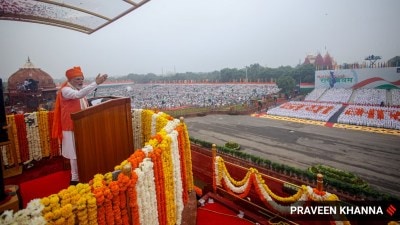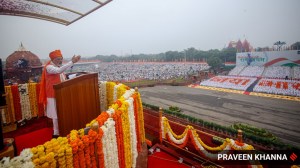Amid Dadar Kabutarkhana row, simmering tension between Jain and Marathi communities escalates
In the past, the Jain and Marathi communities have faced off over issues surrounding language, denial of residence in Gujarati-Jain-dominated clusters, and food preferences.
 In April this year, tensions between the communities came to the fore as MNS workers engaged in heated arguments at a Ghatkopar housing society.
In April this year, tensions between the communities came to the fore as MNS workers engaged in heated arguments at a Ghatkopar housing society.As more than a hundred residents and members of the Marathi Ekikaran Samiti gathered at the Dadar Kabutarkhana in Mumbai Wednesday morning to oppose the Jain community’s support for pigeon feeding, their objections to a Jain monk’s comments became the focal point of the protest.
Earlier this month, Jain monk Nilesh Chandra Vijay threatened to go on an indefinite hunger strike against the decision to shut down Dadar Kabutarkhana, and said the community would take up arms to protect his religion.
The anger also spilt onto Dadar’s streets exactly a week after a crowd of hundreds, including members of the Jain community, tore grey tarpaulin sheets installed over the Dadar Kabutarkhana to feed pigeons forcefully.
While it was the contentious subject of pigeon feeding and the Brihanmumbai Municipal Corporation (BMC)’s ongoing crackdown against kabutarkhanas that triggered the gatherings, the protests have now underscored the simmering tensions between the Marathi and Jain communities in Mumbai.
Claims and counterclaims
As the police detained nearly 15 people Wednesday, those at the gathering alleged selective treatment, and questioned why no action was taken against the members of the Jain community after they violated the Bombay High Court directives and forcefully fed pigeons at the closed spot on August 6.
Voicing their anger against the Jain monk’s comments about picking up arms, the protesters also raised concerns over the use of “weapons” deployed by members of the Jain community to cut through the cover installed by the civic body at Dadar Kabutarkhana.
Members of the Jain community, meanwhile, have viewed the crackdown as the administration’s insensitivity to its religious traditions. They have pointed to the series of actions in the past six months, such as the demolition of a century-old temple in Vile Parle, the crackdown on pigeon-feeding practices, and a court-ordered relocation of a temple elephant.
Past tension between Marathi and Jain communities
The recent flashpoint punctuates the long-standing tensions between the Jain and Marathi communities, which have flared over issues surrounding language, denial of residence in Gujarati-Jain-dominated clusters, as well as food preferences in the past few decades.
Also Read | Why an order by Mumbai’s civic body on feeding pigeons is now before HC
In April this year, tensions between the communities came to the fore as MNS workers engaged in heated arguments at a Ghatkopar housing society. They alleged Marathi-speaking residents had been insulted for eating non-vegetarian food.
In 2023, a political furore erupted after Tripti Devrukhkar, a Marathi woman, alleged that she was denied office space by a Gujarati father and son at Mulund.
Political backing
While the Shiv Sena has been known for championing the cause of Marathi manoos, the Bharatiya Janata Party (BJP) has historically been a strong ally of the Jain community.
With the BMC elections likely to be held in the coming months, the recent tensions between Marathi and Jain communities have yet again rankled parties across the political spectrum over their implications.
While the BJP has tried to assuage the Jain community’s fears by maintaining that the recent actions have stemmed from judicial orders, and not anti-Jain sentiment, the Shiv Sena, Shiv Sena (UBT), and MNS — who are trying to build a ground in the state ahead of the civic polls — have taken up the cause in an attempt to woo its Marathi voter base.
Also Read | From sacred tradition to shutdown: The history and end of Mumbai’s Kabutarkhanas
Despite accounting for only 1.25 per cent of Maharashtra’s population, the Jain community holds a strong sway within the state’s political landscape. The Maharashtra Assembly has seven MLAs from the community (2.43 per cent), six of whom are from the saffron party, with the seventh being part of the BJP-led alliance.
When Jains protested against the closure of Kabutarkhanas, Maharashtra Minister Mangal Prabhat Lodha on August 4 wrote to the civic body appealing for the possibility of alternative feeding spots. Chief Minister Devendra Fadnavis also convened a meeting with members of the Jain community and the Dadar trust Tuesday, where he directed BMC to allow feeding of pigeons at public spaces in a controlled manner to ensure that the birds do not starve.
After this, the Marathi Ekikaran Samiti levelled accusations of preferential treatment towards the Jain community by the state government.
Stand of Shinde Sena and MNS
Meanwhile, the Dadar locals and Samiti’s support for the closure of Kabutarkhanas has found resonance amongst the Eknath Shinde-led Shiv Sena and Maharashtra Navnirman Sena (MNS), which grew on the “sons of the soil” agenda in the city.
In fact, it was Shinde Sena MLC Manisha Kayande who first flagged health concerns caused by the pigeon feeding spots across Mumbai in the Maharashtra Assembly in July, following which Industries Minister Uday Samant directed BMC to ban pigeon feeding in the city.
The decision irked the Jain community, for whom feeding pigeons holds religious significance, nudging them to launch protests.
Following the clash with the police on August 6, Kayande told reporters, “Members of the Jain community tore the sheets which had been laid over the feeding site. This is a complete contempt of the High Court. This is no religious subject, but in fact, a subject of medical science and concerns birds and animals. However, now, the voices of people who have suffered ailments due to the pigeons have been completely stifled.”
On August 10, making a snide statement against Jain members, MNS leader Sandeep Deshpande wore a t-shirt and took to social media to take potshots at ‘Nares, Sures, Pares’, which are common names amongst the community.
As tempers flared further, Jain monk Vijay clarified on August 13 that they were not against Marathis, and also beseeched MNS chief Raj Thackeray to intervene and resolve the matter. Calling Raj Thackeray ‘the god of Marathi language’, he said, “Only he can resolve this matter. Rajasthan may be our janmabhoomi, but Maharashtra is our karmabhoomi.”
In 2015, the Shiv Sena (UBT), through its mouthpiece Saamana, voiced its opposition over the meat sale ban imposed by BMC on account of Paryushan, a Jain holy festival.







